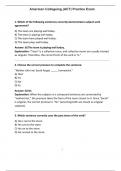American Collegeing (ACT) Practice Exam
1. Which of the following sentences correctly demonstrates subject-verb
agreement?
A) The team are playing well today.
B) The team is playing well today.
C) The team have played well today.
D) The team plays well today.
Answer: B) The team is playing well today.
Explanation: "Team" is a collective noun, and collective nouns are usually treated
as singular. Therefore, the correct form of the verb is "is."
2. Choose the correct pronoun to complete the sentence:
"Neither John nor Sarah forgot _____ homework."
A) their
B) his
C) her
D) its
Answer: B) his
Explanation: When the subjects in a compound sentence are connected by
"neither/nor," the pronoun takes the form of the noun closest to it. Since "Sarah"
is singular, the correct pronoun is "his" (assuming both are meant as singular
subjects).
3. Which sentence correctly uses the past tense of the verb?
A) He is ran to the store.
B) He runs to the store.
C) He ran to the store.
D) He runned to the store.
1
, American Collegeing (ACT) Practice Exam
Answer: C) He ran to the store.
Explanation: The past tense of "run" is "ran," not "runned." Option C correctly
uses the past tense.
4. Choose the sentence with the correct use of commas.
A) I like pizza, ice cream, and, cake.
B) I like pizza, ice cream and cake.
C) I like pizza, ice cream and, cake.
D) I like pizza, ice cream, and cake.
Answer: D) I like pizza, ice cream, and cake.
Explanation: A comma is needed before "and" in a list of three or more items.
This is known as the Oxford comma.
5. Which of the following is a correctly punctuated sentence?
A) The student said "I need help with my homework."
B) The student said I need help with my homework.
C) The student said I need help, with my homework.
D) The student said I need help with my homework.
Answer: A) The student said "I need help with my homework."
Explanation: Direct speech should be enclosed in quotation marks, and
punctuation (comma) should come before the quotation mark if the sentence
introduces dialogue.
6. Which sentence is an example of correct subject-verb agreement?
A) The children plays outside every day.
B) The children play outside every day.
C) The children playing outside every day.
D) The children played outside every day.
2
, American Collegeing (ACT) Practice Exam
Answer: B) The children play outside every day.
Explanation: "Children" is plural, so the correct verb is "play," not "plays."
7. Choose the correctly punctuated sentence.
A) My favorite colors are blue green and yellow.
B) My favorite colors are blue, green, and yellow.
C) My favorite, colors are blue, green and yellow.
D) My favorite colors, are blue green, and yellow.
Answer: B) My favorite colors are blue, green, and yellow.
Explanation: A comma should be placed between items in a list. The Oxford
comma (before "and") is optional but typically used for clarity.
8. Which of the following sentences contains a misplaced modifier?
A) She found the wallet walking down the street.
B) Walking down the street, she found the wallet.
C) She found a wallet while walking down the street.
D) While walking down the street, she found the wallet.
Answer: A) She found the wallet walking down the street.
Explanation: In option A, the modifier "walking down the street" seems to modify
the wallet instead of the person. It should be placed near the noun it modifies.
9. Choose the sentence with the correct form of the verb.
A) They was very tired after the game.
B) They were very tired after the game.
C) They is very tired after the game.
D) They be very tired after the game.
Answer: B) They were very tired after the game.
Explanation: The correct past tense of "to be" with the plural subject "they" is
"were."
3
, American Collegeing (ACT) Practice Exam
10. Select the sentence with correct punctuation.
A) Do you like apples, oranges or bananas?
B) Do you like apples oranges, or bananas?
C) Do you like apples, oranges, or bananas?
D) Do you like apples oranges or bananas?
Answer: C) Do you like apples, oranges, or bananas?
Explanation: The items in the list should be separated by commas, including the
Oxford comma before "or."
11. Which of the following sentences uses the correct verb tense?
A) He had going to the store when I called him.
B) He has gone to the store when I called him.
C) He was gone to the store when I called him.
D) He had gone to the store when I called him.
Answer: D) He had gone to the store when I called him.
Explanation: The past perfect tense ("had gone") is used to describe an action
completed before another past action ("called him").
12. Which of the following is a correctly punctuated sentence?
A) After the meeting, we went to lunch.
B) After the meeting we went, to lunch.
C) After, the meeting we went to lunch.
D) After the meeting we went to, lunch.
Answer: A) After the meeting, we went to lunch.
Explanation: A comma should be used after introductory phrases like "After the
meeting."
4




